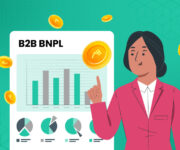The financial industry has hailed OCEN as a “magician’s wand” to solve the Indian MSME sector’s liquidity crunch. It will facilitate the connection between lenders, markets, and borrowers online. And thus, allow the needy to get small-ticket loans.
OCEN is also expected to result in the financial inclusion of the unbanked and boost the number of small enterprises registered in India.
Furthermore, it will build a robust ecosystem that all stakeholders can use to develop innovative products and services for the customers. Apart from that, it will also provide a slew of advantages to small businesses. We’ll go through each one individually.
What is OCEN?
In July 2020, Infosys CEO Nanan Nilekeni introduced the concept of OCEN at the Global Fintech festival. He cited the Open Credit Enablement Network (OCEN), which will digitally connect borrowers and lenders through marketplaces, and make micro-credit available to a hitherto underserved MSME sector.
In short, OCEN is a software infrastructure protocol that links all stakeholders, including lenders, loan service providers (LSPs), and borrowers. The LSPs are usually eCommerce platforms or marketplaces which make this interaction possible.
Recommended: 10 Reasons Why OCEN is India’s Future of Financial Transactions – Finezza Blog
There is an exchange of verified public and private data between those involved. Based on this information, the lenders provide quick, affordable, and low-cost loans to the customer.
9 Reasons Why OCEN is Good for Small Businesses
The MSME sector in India accounts for 30% of the country’s GDP. In 2018-2019, 48% of India’s exports included MSME-related products (investindia.gov.in).
However, only 11% of them can obtain loans from the formal credit market.
But OCEN will change this reality by providing immediate liquidity to the cash-strapped MSMEs.
The following are some of OCEN’s benefits for small enterprises:
1. Financial inclusion
India has 63 million MSMEs (middle and small-sized companies). But 11% of them are eligible for loans from conventional lenders.
The others rely on non-banking financial companies (NBFCs) and loan sharks, who demand exorbitant interest rates. With OCEN, the remaining 89 % of borrowers will be able to get credit at a cheaper interest rate. This will also promote the goal of financial inclusion of the unbanked population.
2. Data equals loan
Lending institutions overlook small businesses because they lack a credit history. The widespread digitisation has helped eCommerce platforms, and marketplaces access vast amounts of customer data.
Lenders can utilise this information to design solutions tailored to the needs of small enterprises. For example, an LSP may now examine a merchant’s GST data to determine their reliability and grant them a loan.
3. Customised credit
Small businesses have their specific credit needs. They need a small loan for a shorter duration and a quick repayment facility. This was deemed unprofitable by the conventional lenders who preferred high-value clients. This, however, will change with the arrival of OCEN.
MSMEs would be able to obtain modest and large-ticket loans with low-interest rates. Furthermore, LSPs and lenders will offer these loans based on the borrower’s cash flow rather than their balance sheet. Hence, it will welcome change for the hitherto neglected MSME sector.
4. Daily credit availability
Along with the small-sized loan, intraday credit with OCEN cannot be ruled out. For instance, a Kirana store owner and a person in need of a one-day loan will be able to get it soon with OCEN. It implies that everyone who can pay back a loan at the end of the day will be able to get one the same morning.
Recommended: OCEN – The Way Ahead for Digital Lending and MSMEs – Finezza Blog
5. Low-interest rates
Lenders will be able to save money on loan processing and operational costs, thanks to OCEN. In addition, LSPs and lenders will save time and money because the entire financing cycle will be conducted online. As a result, they will be able to offer credit to a more significant number of consumers at cheaper interest rates.
6. Growth for everyone
All stakeholders—LSPs, lenders, and borrowers—will work in tandem to help themselves and the economy flourish. LSPs will encourage lenders to provide tailored credit solutions to their customers.
Borrowers will be able to take advantage of these customised loans to expand their businesses. In the long term, everyone will gain from this cash inflow.
7. Quick loan disbursement
Today banks and NBFCs take about seven days to process any loan application. The whole loan cycle will be managed online using OCEN, from loan origination through verification and approval.
Furthermore, the stakeholders will share the borrower’s consent-based data. Because this data has already been verified, it will reduce the turnaround time. As a result, the loan will also be issued to the borrower swiftly.
8. Security
OCEN is based on the smooth interchange of data between all parties involved. The consumer has given their full permission for this transaction. Stakeholders will keep the information secure. As a result, there are fewer chances of data leakage.
9. Anytime a credit
MSMEs will be able to apply for a loan in the morning and receive credit at the end of the day once OCEN is in place. Their loan application will not be delayed due to a holiday or weekend. They may request a loan at any time, on any day, and get the funds as soon as possible.
As a result, OCEN will open up an ocean of possibilities for MSMEs, LSPs, and lenders. It will help the Indian economy by fostering growth for all stakeholders. It will also help MSMEs expand without concern about running out of or after finance.
If you’re an LSP or a lender wanting to improve your loan cycle management stack, get in touch with Finezza. We can help you manage your loan cycle systems with our effective solutions.




Leave a Reply